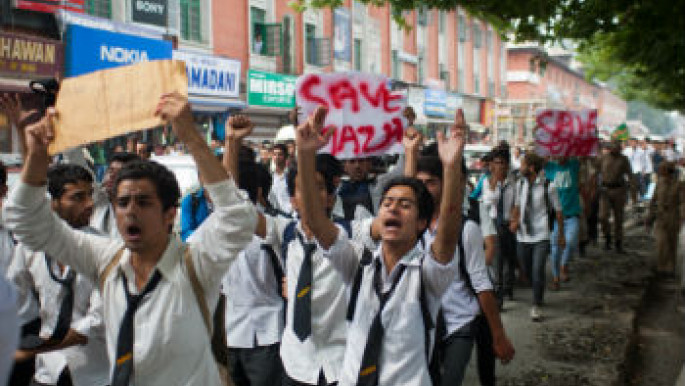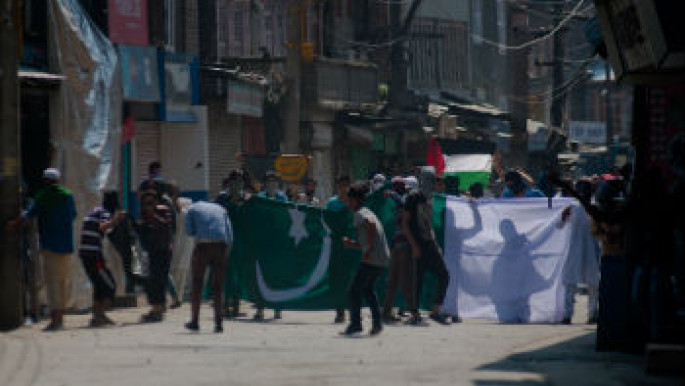
Kashmir and Palestine: A history of occupation and solidarity
A decolonised Cuba helped Mandela's South Africa to break the apartheid regime, which then supported Yasser Arafat's struggle for an independent Palestinian state. Similarly, the Non-Aligned Movement was the offspring of a collaborative effort of formerly colonised countries.
The trend has carried on since then, as Kashmiris, Palestinians, Chechnyans, People of Colour in America, Maoists in India, Tamils in Sri Lanka, all have acknowledged a united struggle - at least in diplomatic practice - against their oppressors.
India and Israel are engaged in an openly fully fledged military romance. Kashmir's affection with Palestinian struggle has been evident for a long time.
Genesis of solidarity
It stems from Kashmiris' two-fold identification with the Palestinian people. One thread is the common religion that the two people share, a point of concurrence being the Al Aqsa mosque, the third-holiest site to Muslims all over the world. The other is the similar set of struggles waged to achieve the right to self-determination against a foreign occupier stationed on their lands based upon military might.
 |
|
| Kashmiri Muslim students shout anti-Israeli slogans during a protest in Srinagar against Israel's military operation in Gaza in 2014 [Getty] |
Both these factors, the religious one being more significantly apparent, operate in tandem for Kashmiris to raise a cry everytime Israel points its guns towards Palestinians.
The solidarity was highly visible as Donald Trump announced his recognition of Jerusalem as the capital of Israel. The US move drew criticism all over the globe, especially the Muslim world.
Kashmir observed a complete shutdown on December 8. Shops were closed, public transport stopped and rallies were organised with people carrying banners saying "Down With Trump".
Not something new
Kashmiris protested against the desecration of Al Aqsa Mosque by Israel in the 1960s, also resulting in a curfew being imposed. The walls in Srinagar have long been painted with pro-Palestinian graffiti.
The solidarity of Kashmiris with Palestinians is more intense than the reciprocal but not absolutely unidirectional as graffiti depicting support for an independent Kashmir can also be found in Palestine. The late Grand Mufti of Jeruslaem, Amin al-Husseini, was always critical of Indian rule over Kashmir.
Read more: Israel's blossoming romance with India crushes both Kashmiris and Palestinians
This solidarity is not new found, but dates back to decades of conflict marring both nations. However it has been heightened by the use of social media as a connecting link between the two peoples, who might rarely happen to meet each other or visit each other's land.
"Social media has helped us share newer methods of protest and also how to deal with teargas," says Muhammad Faysal, a Kashmiri student activist.
Many in Kashmir also argue that stone-throwing as a collective form of protest was inspired by Palestinians; the 2008 and 2010 uprisings against Indian rule are referred to as the "Kashmiri Intifada" here.
2014 Gaza crisis
When Suhail Ahmed Lone was shot dead by paramilitary forces in Kulgam district, 60km from Srinagar city, on 19 July, 2014, Indian-administered Kashmir was undergoing protests against Israel's military offensive on Gaza. The offensive claimed around 2,000 Palestinian lives, mostly civilians; women and children.
 |
|
| Kashmiri protesters throw stones at Indian government forces amid an exploding teargas shell during a demonstration marking al-Quds and Kashmir Days [Getty] |
Suhail, the youngest son of Ghulam Qadir Lone, a labourer by profession and a ninth-class student in the local high school, was declared "dead on arrival" by doctors at the Anantnag hospital.
The protests of which he was alleged to be a part were into the third day, with a youth injured on the previous day nearby.
Back then, the head cleric at Kashmir's Grand Mosque had called for a boycott of Israeli products in sync with the Boycott, Divestment, Sanctions campaign. The call was supported by local traders as well.
At the same time, sensing anti-Israel sentiments in the valley, Israel issued a travel advisory asking its citizens to stay away from Kashmir, which usually serves as a top tourist destination.
India-Israel relations
India has historically yet symbolically supported the sovereign statehood of Palestine - which it recognised in 1988 - until the right-wing government under Narendra Modi came to power in 2014.
A complete reversal of foreign policy vis-à-vis Israel-Palestine came into operation. India recognised Israel way back in 1950, and developed diplomatic relations in 1992.
Pertinently, as a sign of this new policy, in 2014 India abstained from voting in support of the UNHRC resolution criticising Israel's military atrocities in Gaza. But in 2017, India voted for an Arab-sponsored resolution against Trump's recognition of Jerusalem as Israel's capital - considered a balancing act to India's support of 1950s motions Israel's entry to the UN and condemning Zionism.
Read more: India must not forget its historic support for Palestine
Israel supplied India with arms for the Indo-China war in 1965 and two India-Pakistan wars in 1971 and 1999. India continues to remain the largest export client of Israeli arms, spending over $10 billion in the past decade alone.
The two countries organise collaborative military training programmes as well.
As Binyamin Netanyahu landed in India on Sunday, 14 January 2018, he became the second Israeli premier, after Ariel Sharon, to do so. Previously, Narendra Modi visited Israel in July 2017. Ministers of both have made frequent visits, deepening bilateral ties.
An indifferent United States
Sumantra Bose, in his book Contested Lands argues that the intervention of the US in both these conflicts would lead to an early resolution of their political futures - as happened in the Bosnian conflict.
 |
The Trump-Netanyahu-Modi nexus of right-wing governments does not prove optimistic for the resolution of the conflicts in Kashmir or Palestine |  |
However this argument has been rendered moot after Donald Trump assumed power. The establishment of a "Jewish state" would satiate Trump's Islamophobic desires and the subjugation of Kashmir is similarly vital to the Modi government's dream of a Hindu India.
The US has remained as indifferent to Kashmir as it has to Palestine, paying mere lip service while securing its allied partnership with India and Israel. The Trump-Netanyahu-Modi nexus of right-wing governments does not prove optimistic for the resolution of the conflicts in Kashmir or Palestine, which remain as they are, worse than before but not promising.
Cultural resistance
On the cultural front, the keffiyeh, used by Palestinians as a political statement, is worn in Kashmir too, with full consciousness of what it represents. Articles written by Kashmiri writers have been frequently published by online portals in Palestine, while as Kashmir Reader, a local daily newspaper in Kashmir, has been carrying a regular column from Dr Ramzy Baroud, a Palestinian scholar and activist.
Read more: Bullets, teargas, shelling: Kashmir's stand in solidarity with Palestine
Coincidentally, when the same newspaper was banned for three months by the Indian state, one of the reasons mentioned was that it provided space to articles written by Dr Baroud - who termed it as "surprising yet less irrational... oppressors are always nervous when people show solidarity with one another".
Similarly Ghadeer Abd Rabou, a Palestinian student, translates the work of young Kashmiri writers from English into Arabic and posting it on her blog Palestine for Kashmir.
Future prospects
Palestine is in the heart of Middle East, the centre of the world's fuel industry, which has kept the region in the limelight more often than Kashmir - which is a small territory on the peripheries of the Muslim world. Palestinian people have been using the cultural grounds well to popularise the need to fulfill their rights.
A vast amount of scholarship coming from Palestinians, notably from the diaspora, has helped their cause. The same has been lacking in Kashmir - maybe because of the underdevelopment, much of which is a direct outcome of the Indian administration. Educating and organising together can help muster the courage required to agitate.
While Palestinians have been dispossessed of their land, people shot dead, incarcerated, infrastructure bombed and the whole territory put under siege by Israel, tens of thousands of Kashmiris have been killed, thousands disappeared and hundreds of women raped by the Indian state.
Both conflicts linger on, in a global order that has turned vehemently racist and Islamophobic. All is left to the conflict-marred people of these two nations, and others all over the world, to coalesce into one liberating force against their oppressors.





 Follow the Middle East's top stories in English at The New Arab on Google News
Follow the Middle East's top stories in English at The New Arab on Google News


